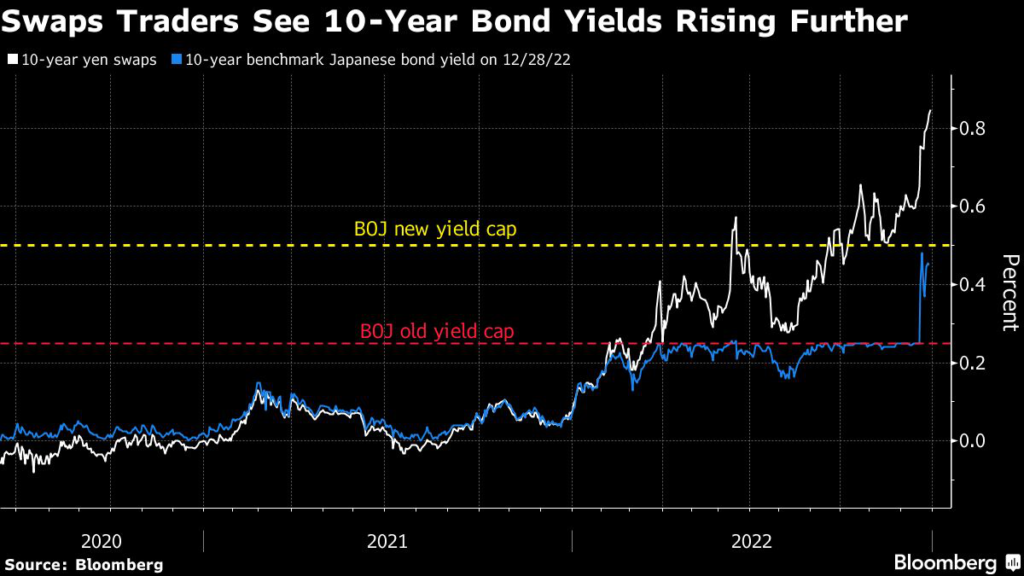The Bank of Japan announced an unprecedented third day of unscheduled bond purchases as it fights back against speculation it is about to end its super-accommodative monetary policy.
(Bloomberg) — The Bank of Japan announced an unprecedented third day of unscheduled bond purchases as it fights back against speculation it is about to end its super-accommodative monetary policy.
The combination of additional fixed-rate and fixed-amount purchases announced Friday have boosted this month’s buying to about ¥17 trillion ($128 billion), a monthly record, according to data compiled by Bloomberg.
The BOJ’s avalanche of bond buying follows a surge in yields since the central bank unexpectedly raised its ceiling for the benchmark 10-year note to 0.5% at its Dec. 20 meeting. While policy makers said the move was to improve market functioning, traders have interpreted it as a step toward the end of the yield-curve control policy as they load up on shorts for potentially a defining 2023 strategy.
“Honestly, I don’t understand the BOJ’s intention,” Kazuhiko Sano, chief bond strategist at Tokai Tokyo Securities Co., wrote in a research note. “The wider trading band is only fanning speculation of more policy changes and increased bond purchases risk reducing market liquidity even further.”
EXPLAINER: Why BOJ’s Small Tweak to Bond Yields Was a Bombshell
The BOJ on Friday offered to buy unlimited amounts of two-year bonds at a yield of 0.04%, and five-year debt at 0.24%, along with a total ¥700 billion of one-to-10 year bonds and ¥300 billion of 10-to-25 year debt. That’s in addition to daily operations to buy unlimited quantities of 10-year securities and futures-linked securities at 0.5%.
The BOJ also said late Thursday it would provide banks with no-interest two-year loans next week.
Funds from BlueBay Asset Management to Schroders Plc have said they added to short positions on Japanese bonds, with some also buying the yen. Meanwhile, economists have said Governor Haruhiko Kuroda eroded his credibility with the policy switch without warning.
Japan’s bond market will be closed Monday and Tuesday for New Year, and only reopen Wednesday. The Ministry of Finance will auction ¥2.7 trillion of 10-year bonds on Thursday.
“It looks like the BOJ isn’t tolerating higher yields on shorter notes,” said Keisuke Tsuruta, a bond strategist at Mitsubishi UFJ Morgan Stanley Securities Co. in Tokyo. “These are probably preemptive measures because foreign funds come back after the New Year holiday and there will be a 10-year note auction.”
The 10-year bond extended gains after the BOJ’s additional debt purchases operation was announced, with its yield falling 4.5 basis points to 0.41%. The yen strengthened as much as 0.5% against the dollar even though efforts to cap bond yields are generally negative for the currency.
The BOJ’s struggle to contain rising local yields may have a global consequence as investors in the nation own $2.4 trillion of foreign debt. Higher local yields may spur Japanese investors to bring home more funds, exacerbating upward pressures on bonds around the world.
“The ripples from the BOJ move continue to impact markets,” Martin Whetton, head of fixed income and currency strategy at Commonwealth Bank of Australia, wrote in a research note. “Hedge costs remain punitive. The yen could retrace, which leaves unhedged buyers out of pocket and the domestic yields of course are attractive.”
The BOJ may surprise markets again by tightening monetary policy as soon as next month, Eisuke Sakakibara, a professor at Aoyama Gakuin University in Tokyo and a former vice finance minister, said in an interview with Bloomberg Television last week.
The table below shows the details of this week’s unscheduled operations:
–With assistance from Yoshihiro Sato, Saburo Funabiki and Hidenori Yamanaka.
More stories like this are available on bloomberg.com
©2022 Bloomberg L.P.










